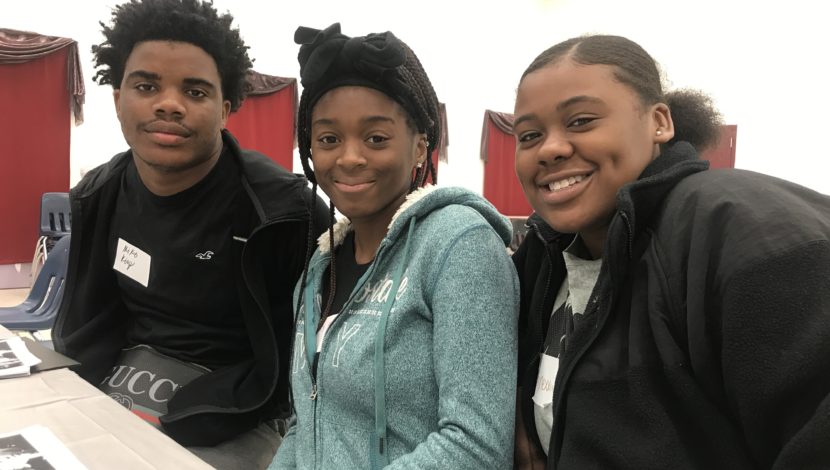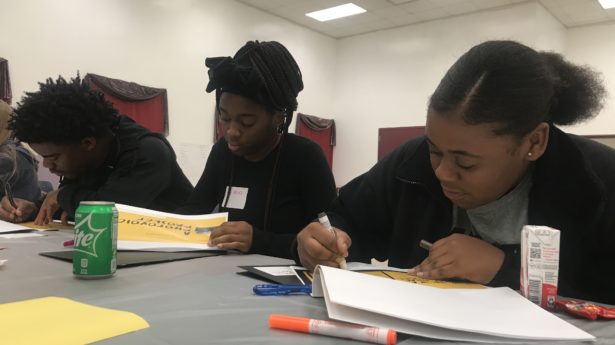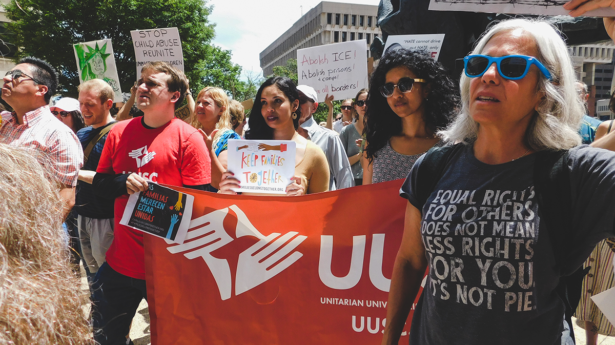The Unitarian Universalist Service Committee advances human rights through grassroots collaborations.
After the Storm: Displaced Youth Tell Their Stories Post-Hurricane Michael

By on January 14, 2020
When Jan Booher, the director of Unitarian Universalist Justice Florida (UUFJ) , invited me to come to Panama City and see the aftermath of Hurricane Michael a year after the storm, I thought I knew what to expect. Having grown up in central Florida, I have lived through many hurricane seasons: from filling water jugs and changing out batteries in flashlights to walking out after the storms to help clean up the pieces of roofs, garages, and fences that had been scattered throughout the city. However, driving past the abandoned homes and miles of boarded up businesses with Jan, I could tell that this wasn’t the aftermath of just another storm. What I had been asked to come witness was the devastation of both a natural and man-made disaster. This is what it looks like when people are forgotten in the aftermath.
On October 10, 2018, Panama City, Florida, experienced the worst natural disaster the Panhandle has ever seen. Hurricane Michael was the first Category 5 storm in recorded history to make landfall in the northeast Gulf Coast. With wind gusts as high as 162 miles per hour, the storm came with such force that no one could have prepared for the unprecedented damage and destruction it caused. To date, the toll of the storm includes 32 deaths in the United States, an estimated $25 billion dollars in damages, and thousands of displaced residents not able to return to their homes. With Michael, 2018 became the fourth consecutive hurricane season to feature at least one Category 5 hurricane (Matthew in 2016; Irma and Maria in 2017) and its aftermath was met with what Jan describes as, “hurricane relief fatigue”.
The lack of media coverage and inadequacy of state support and national funding stand in stark contrast to the hard work and determination by those who call Panama City home. The Lead Coalition of Bay County, UUJF, and UU Fellowship of Bay County came together with local schools, service providers, and nonprofits to create the Community Resource Center of Bay County, currently housed at the Bay County Library, a one-stop shop for public assistance and support for post-Hurricane Michael rebuilding and recovery. Even a year after the resource center opened its doors, people can be found lined up through the lobby and into the overflow of the library hoping to sort out FEMA paperwork or find assistance with groceries.
In one of the conversations leading up to this visit with Jan Booher and Janice Lucas—the executive director of the Lead Coalition—we had brainstormed ideas on how UUSC could support the recovery efforts in the area, and one request in particular took root: “Can you help us tell our own stories?”—a resilient plea from a community refusing to be forgotten. And what continues to become clearer as UUSC deepens its commitment to supporting post-hurricane communities is that before people are forgotten they have to be ignored. UUSC has partnered with UUJF, the LEAD Coalition and Rosenwald High School in creating the visual storytelling project “Coming of Age in the Eye of Michael.” UUSC helped provide cameras and funding for 15 youth from Rosenwald High School to tell their own stories of resilience in the aftermath of the storm. Their photographs will be featured as an exhibit at the Panama City Center for the Arts for a few weeks, starting on January 17. The students and their photos will travel to Tallahassee, the state capital, as part of an advocacy effort to pass Senate Bill 502: Emergency Mitigation and Response, which would bring housing and funding options to the city.
What we’re seeing in Panama City is similar to what we’re seeing in the Bahamas with Hurricane Dorian: A disheartening and terrifying pattern of abuse and neglect heaped upon communities viewed as unworthy in the eyes of the local and national governments. Low-income families, the homeless, immigrant neighborhoods, people of color, and those living with disabilities face even more injustice after the storms as they are often overlooked after the rains have cleared and the process of rebuilding begins.
We see this in Panama City, where low-income youth and families are facing a troubling amount of housing insecurity and poverty. In the Bahamas, just last September, Hurricane Dorian took the lives of at least 70 people (a low estimate as the dead are still being counted) and caused at least four billion dollars in damage. In its wake we’re seeing injustice rear its head again. An estimated 8,000 Haitian immigrants who live on the islands have been displaced and the Bahamian government has made no pledges to protect this community, instead making threats of detention and deportation (a November estimate puts the number of Haitians deported since the storm at 340). UUSC has pledged to work with displaced communities on the ground like these immigrants to ensure that in the medium and long term, these groups are centered in not only recovery efforts, but also in other conversations regarding their livelihoods.
We call this unsettling trend rapid-onset climate-forced displacement. Natural disasters like earthquakes, typhoons, tornadoes, and hurricanes not only bring loss in terms of human lives, monetary costs, and damaged infrastructure; there’s also the social cost of housing displacement and the neglect – and outright discrimination – we see after the skies have cleared.
In the late summer of 2017, Category 4 Hurricane Harvey landed in Louisiana and Texas, not only causing many deaths, but billions of dollars in damage and the displacement of 30,000 people. UUSC and its members mobilized in support of communities who were hardest hit. From undocumented immigrants tasked with rebuilding an entire city to people with disabilities and low-income families trying to make ends meet post-hurricane, UUSC partnered with groups on the ground to ensure these communities were treated with dignity and respect and had a say in their own recovery.
As we’ve done in places like Houston and Haiti, we will do in Panama City. In partnership, we are transforming the narrative of the forgotten city and storm: The people of Panama City remember every day, and together we will make sure they are not ignored.
Photo Credit: UUSC
***
About UUSC: Guided by the belief that all people have inherent worth and dignity, UUSC advances human rights globally by partnering with affected communities who are confronting injustice, mobilizing to challenge oppressive systems, and inspiring and sustaining spiritually grounded activism for justice. We invite you to join us in this journey toward realizing a better future!

